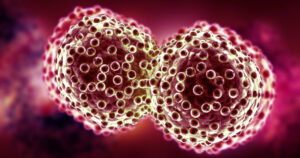What is Cancer?
Cancer is a disease where abnormal cells grow and spread in the body. These cells can invade and harm nearby tissues, affecting important organs and systems. Cancer can occur anywhere in the body and can be very serious and life-threatening.

Causes of Cancer:
It can happen because of different things like genes, environment, and lifestyle. Some people may get cancer because of their family history, while others might get it from things like smoking, being in the sun too much, or breathing in bad air. Eating unhealthy food, not moving enough, and feeling stressed for a long time can also raise the chance of getting cancer.
Symptoms of Cancer:
It’s symptoms change depending on the type and where it is. Some common signs include:
- Losing weight without trying
- Feeling tired all the time
- Changes in bathroom habits
- Unexplained pain or swelling
- A cough that won’t go away
- Changes in the way moles or skin looks
Many of these signs can be caused by other things, but if they last a long time or worry you, it’s important to see a doctor to find out what’s going on.
Types of Cancer
- Breast Cancer: It occurs when abnormal cells in the breast tissue grow and multiply uncontrollably. It is the most common among women worldwide.
- Lung Cancer: It develops in the tissues of the lungs, usually in the cells lining the air passages. It is strongly associated with smoking and exposure to carcinogens such as asbestos and radon.
- Prostate Cancer: It affects the prostate gland in men, which produces seminal fluid. It is one of the most common types of cancer in men and tends to grow slowly.
- Colorectal Cancer: It begins in the colon or rectum and typically develops from precancerous polyps. It is highly treatable when detected early through regular screening tests.
- Skin Cancer: It occurs when abnormal cells in the skin grow out of control. The most common types of skin cancer include basal cell carcinoma, squamous cell carcinoma, and melanoma.
- Bladder Cancer: It develops in the tissues of the bladder, which stores urine. It often presents with symptoms such as blood in the urine and changes in urinary habits.
- Leukemia: Leukemia is a type of cancer that affects the blood and bone marrow, where blood cells are produced. It involves the overproduction of abnormal white blood cells, which impairs the body’s ability to fight infection.
- Lymphoma: Lymphoma is a cancer of the lymphatic system, which is part of the body’s immune system. It can affect lymph nodes, spleen, bone marrow, and other organs involved in the production and storage of lymphocytes (a type of white blood cell).
- Pancreatic Cancer: It begins in the tissues of the pancreas, an organ located behind the stomach that produces enzymes for digestion and hormones such as insulin. It is often diagnosed at an advanced stage and has a poor prognosis.
- Ovarian Cancer: It affects the ovaries, which are the female reproductive organs that produce eggs and hormones. It is often called the “silent killer” because it may not cause symptoms until it has spread beyond the ovaries.
Treatment Options
The treatment options for cancer depend on several factors, including the type and stage of the disease, as well as the individual’s overall health and preferences. Some common treatment modalities may comprise:
- Surgery: Doctors may recommend surgically removing cancerous tumors to eliminate localized cancer or reduce tumor size before other treatments.
- Chemotherapy: Chemotherapy entails using powerful drugs to kill cancer cells or prevent their multiplication. Doctors may use it alone or in combination with other treatments like surgery or radiation therapy.
- Radiation Therapy: Radiation therapy employs high-energy radiation to target and destroy cancer cells. Doctors may deliver it externally or internally, depending on the type and location of the it.
- Immunotherapy: Immunotherapy boosts the body’s immune system to recognize and attack cancer cells. It has shown promising results in treating certain types of cancer, including melanoma and lung cancer.
Healthy Diet :
Read more about Diabetes , Heart Attack
